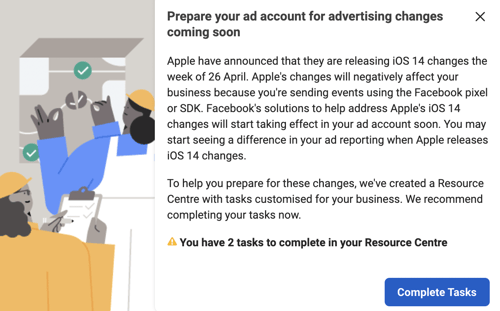The Apple iOS 14 privacy update is changing the way marketers and advertisers promote their businesses using customer data - but it doesn’t have to be the end of advertising to iPhone users altogether.
Last week we shared the news regarding the iOS 14 update that will mean whenever you download an app from the App Store you will get a pop-up asking if you want to grant the app permissions to track your activity across apps and websites owned by other companies.
You may have already had a warning pop up from Facebook when accessing your Ads Manager, like the one we received below:

This week we’re looking at what advertisers can do to prevent this from causing too much issue with paid social advertising, including remarketing using the Facebook Pixel and general targeted paid ad campaigns on Facebook - and its other owned platforms, i.e. Instagram, Messenger and WhatsApp.
Segment audiences based on type
You can target campaigns based on operating system type - Android vs iOS. The iOS update only impacts those using Apple iOS devices, anyone using Android will remain unaffected. Split your campaigns to reflect this and see just what difference it makes. this also means you won’t see reductions campaign-wide, skewing your whole data set.
When you create campaigns that target Conversion events, go to Specific Mobile Devices & Operating Systems and select Android Devices Only.
Prioritise your most valuable events
If you are using Facebook Pixel for Conversion and Retargeting campaigns, you will be hit by the changes, as Facebook will only receive data from eight Pixel events per domain.
You need to think cleverly about which data really matters to you and adjust your data tracking to suit. Facebook will choose the eight highest priority data sets for you, but you can always change or reorder these choices, via Ads Manager and going to Events Manager.
Verify your domainA lesser-known tactic is to verify your domain allowing Facebook to better prevent the misuse of Ad accounts. In the verification process, your webmaster will be given a code to put on your domain.
Verify your domain by logging into Business Manager, navigate to Brand Safety and choose Domains.
Utilise independent tracking and retargeting activities
You don’t have to rely on Facebook data to monitor website conversions, instead, look at your website platform’s tracking system to monitor visitors’ behaviour and origin.
You can also look at adjusting how you use Facebook to monitor visitors’ activity, why not look at different bid types, audience definitions and events within your ad testing? Or, you can use campaigns outside the conversion objective, i.e. like tracking the traffic your ads are generating to your site.
Manual data collection, or having to adjust your campaigns significantly, may not seem particularly effective or intuitive, but it will help you manage the changes that will result from the iOS update, whilst coming up with a more robust solution longer-term.
At the moment we don’t know, for definite, how much - or not - the new update will impact advertising with Facebook. However, it is a clear indication that advertisers need to be considerate of consumers’ data and look at more ways than purely relying on paid advertising to get their message ‘out there’.
Remember, the marketing landscape has long been dominated by new activities and major changes, not least GDPR just a few years ago. This iOS update may have a massive impact, but it also just might not...